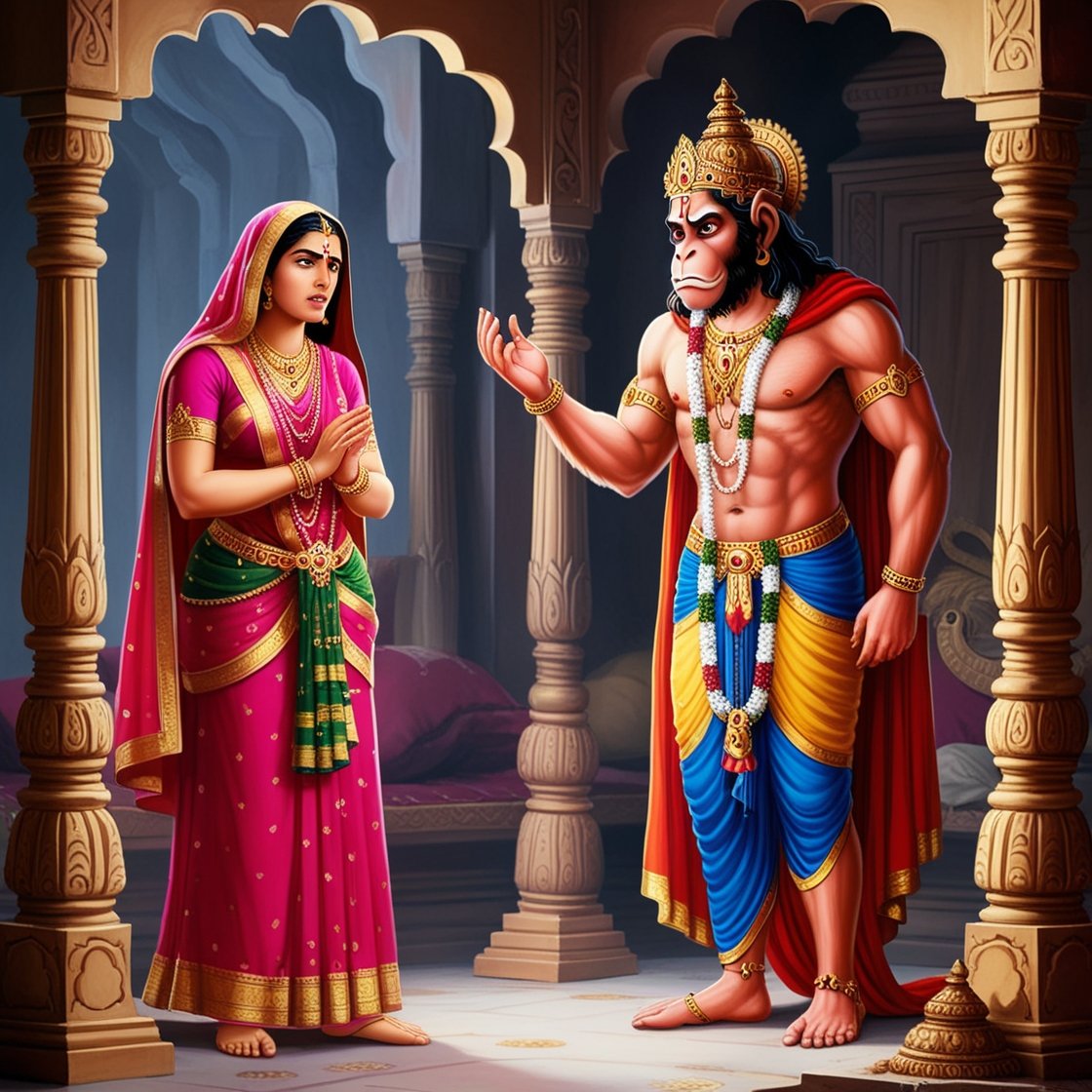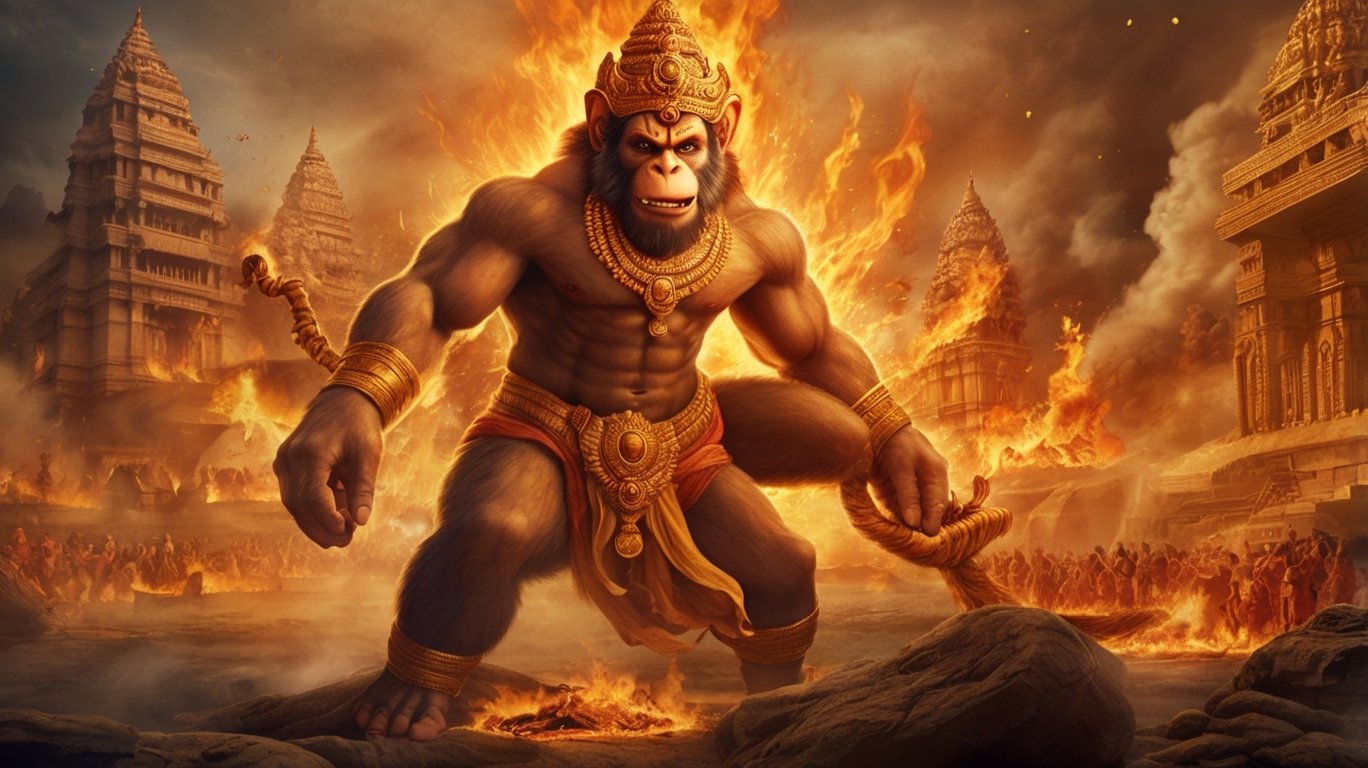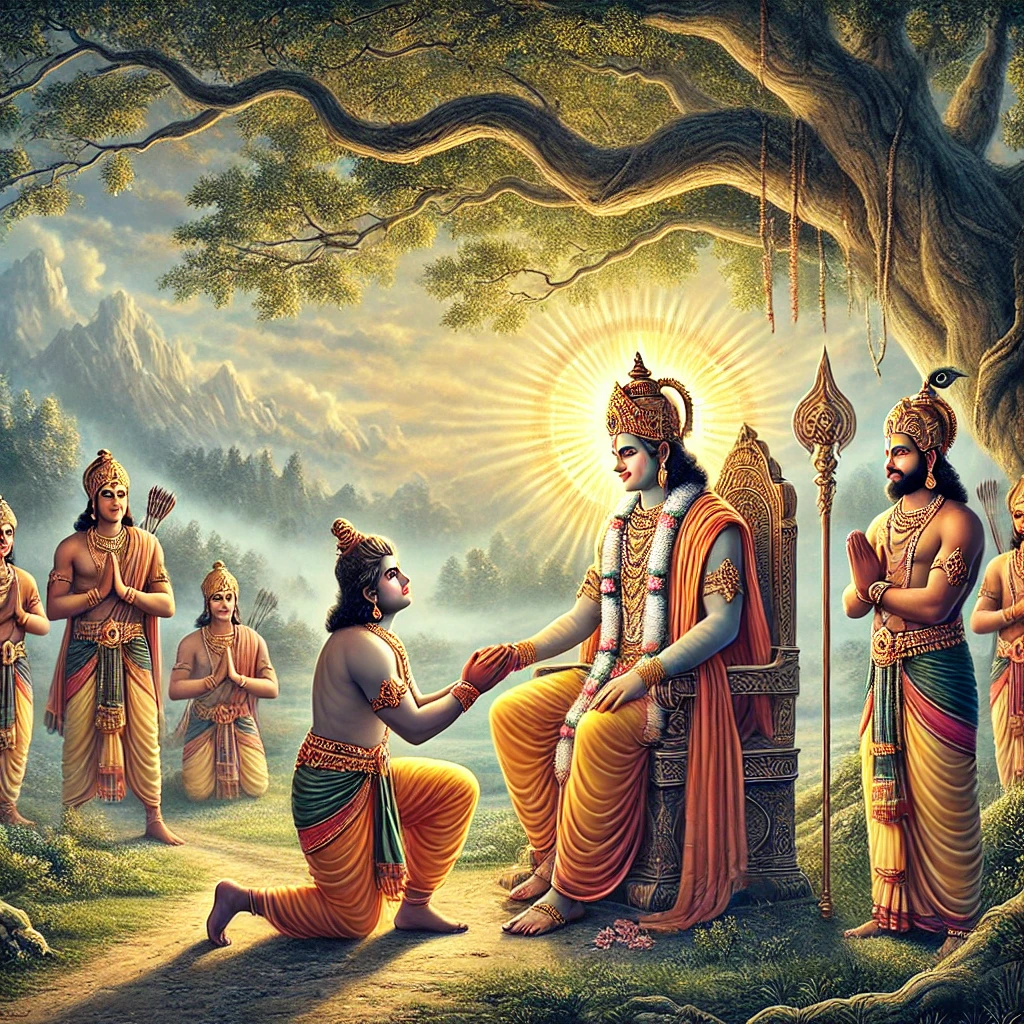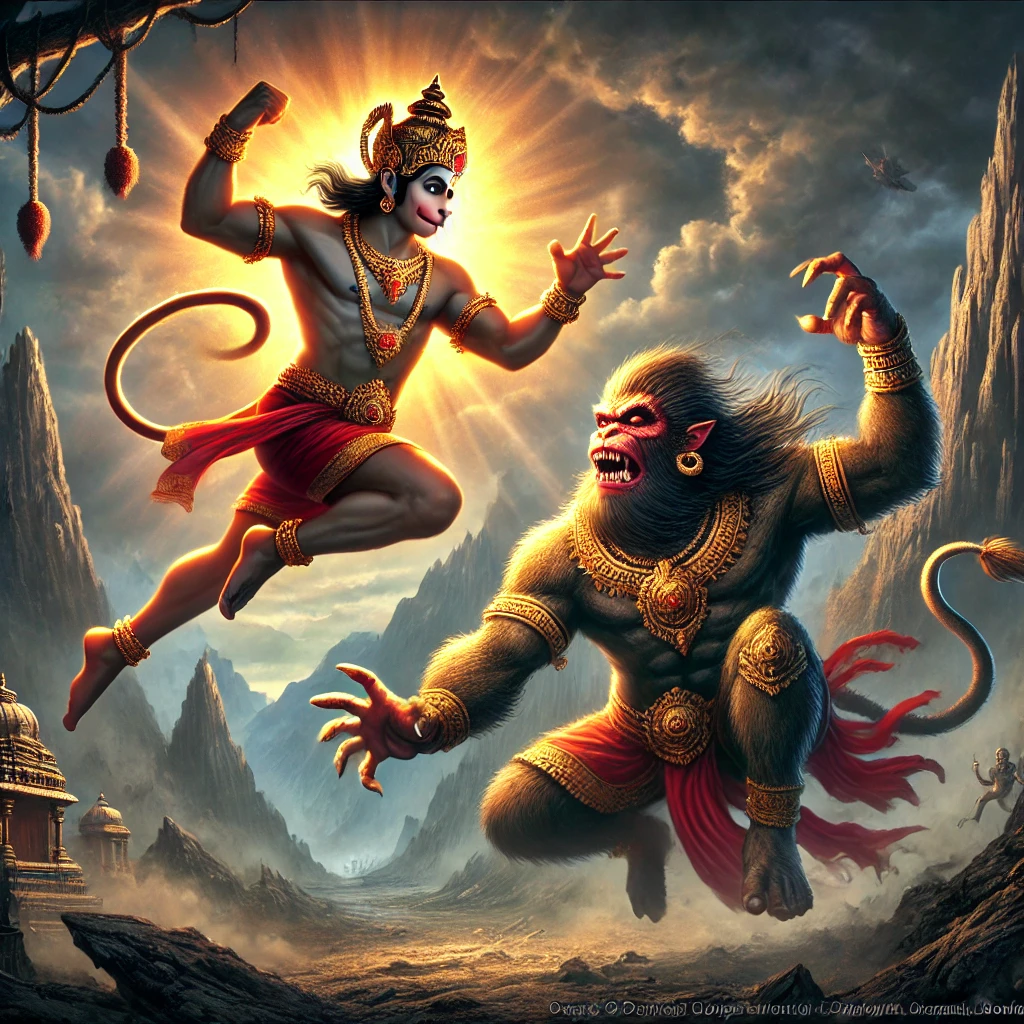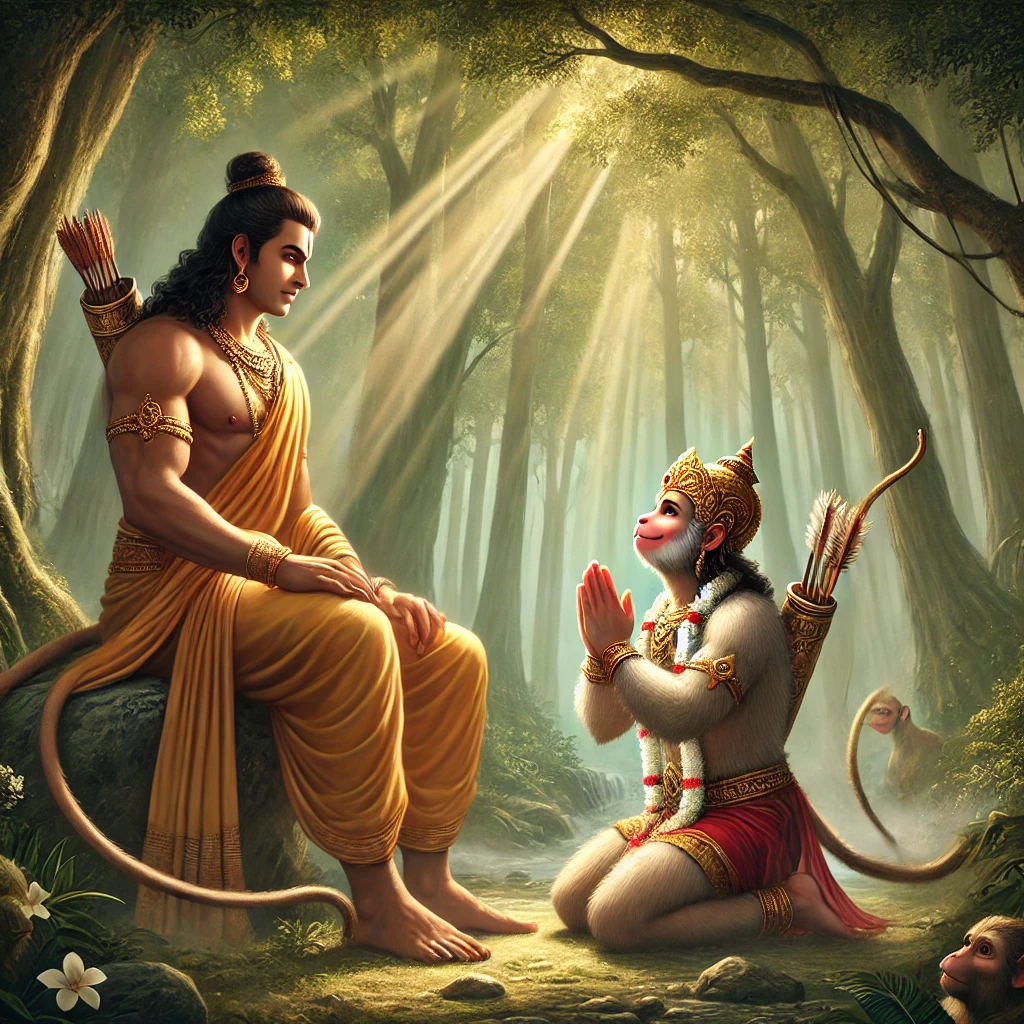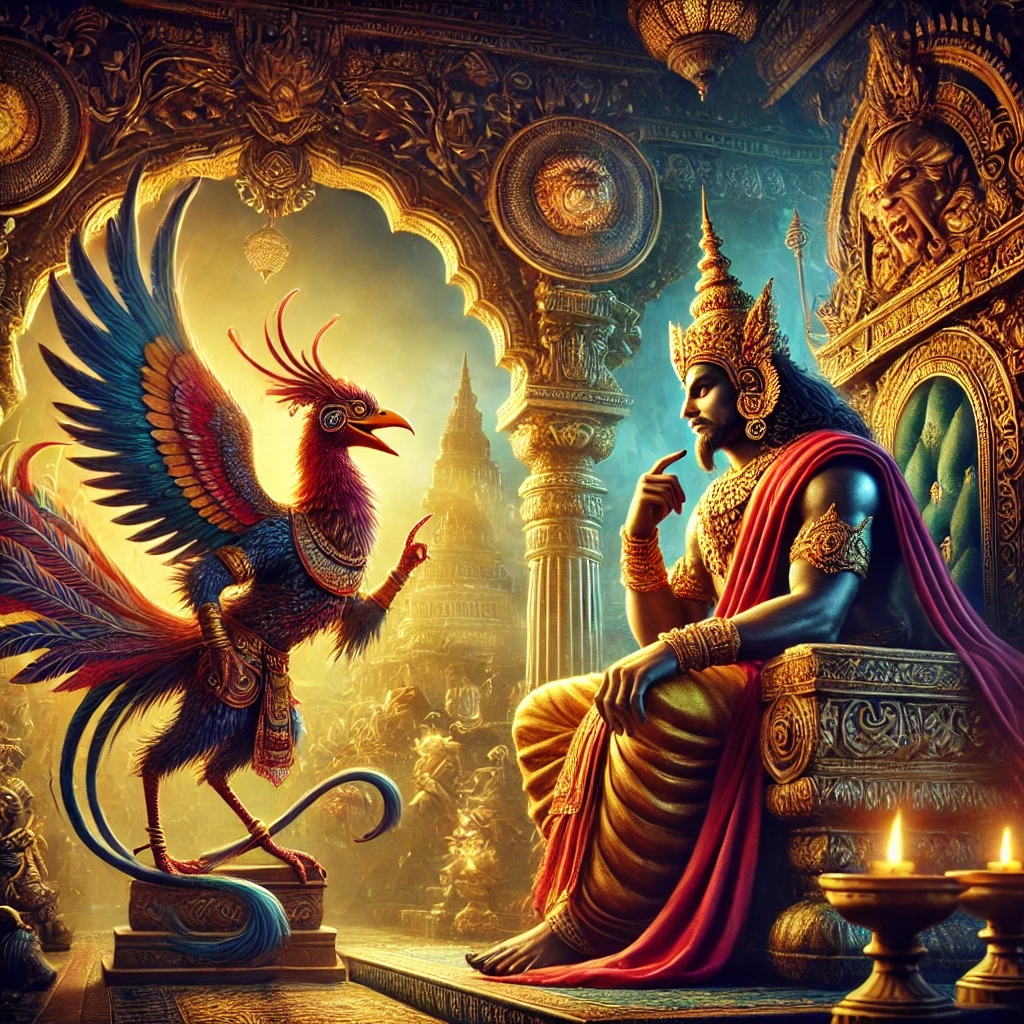Introduction
Welcome to Bedesii.com, where we embark on a journey through the timeless wisdom of the Sundarkand. This passage invites us to witness the profound lessons hidden in Lord Rama’s epic journey, and here we meet the compelling exchange between Ravana and his younger brother, Vibhishana—a tale rich in teachings on leadership, humility, and the importance of wise counsel.
In today’s exploration, we encounter the moments leading up to a critical turning point. Ravana, blinded by arrogance and the sycophantic words of his court, dismisses all warnings, even from his well-wishing brother, Vibhishana. Through Vibhishana’s earnest pleas, we delve into ageless truths about the destructive power of unchecked ego, the virtues of compassionate guidance, and the grace found in choosing righteousness over pride.
Together, we’ll uncover how these ancient verses speak to our lives today, revealing lessons on humility, devotion, and the resilience of the human spirit. Join us as we walk through each verse, seeking to apply these timeless principles to our paths.
jitehu surasur taba shrama nahi, nara banara kehi lekhe mahi
Doha
sachiva baida gura tini jou priya bolahi bhaya asa,
raja dharma tana tini kara hoi begihi nasa
Explanation
We see Ravana’s confidence as he disregards the threat posed by Lord Rama and the army of monkeys, feeling invincible after previously defeating gods (Devas) and demons (Asuras). This line shows Ravana’s arrogance, as he believes that mere humans and monkeys pose no challenge to him, underestimating the strength of Lord Rama’s divine purpose.
The verse provides a timeless principle on leadership. It says that a king (or leader) should always heed the advice of those close to him—specifically his ministers (sachiva), physicians (vaida), and spiritual guides (guru). When these three figures speak from concern or fear, the leader should listen carefully. If a leader ignores their advice, it can quickly lead to his downfall. This verse emphasizes that leaders who do not consider wise counsel often face destruction, as they lose the support and insight needed to sustain their rule.
Chaupai
soi ravana kahu bani sahai, astuti karahi sunai sunai.
avasara jani bibishanu ava, bhrata charan sisu tehi nava.jo apan chahai kalyana, sujasu sumati subha gati sukha nana.
so parnari lilara gosai, tajau chauthi ke chanda ki nai.chaudah bhuvana ek pati hoi, bhutadroha tishtai nahi soi.
guna sagara nagara nara jou, alapa lobha bhala kahai na kou.
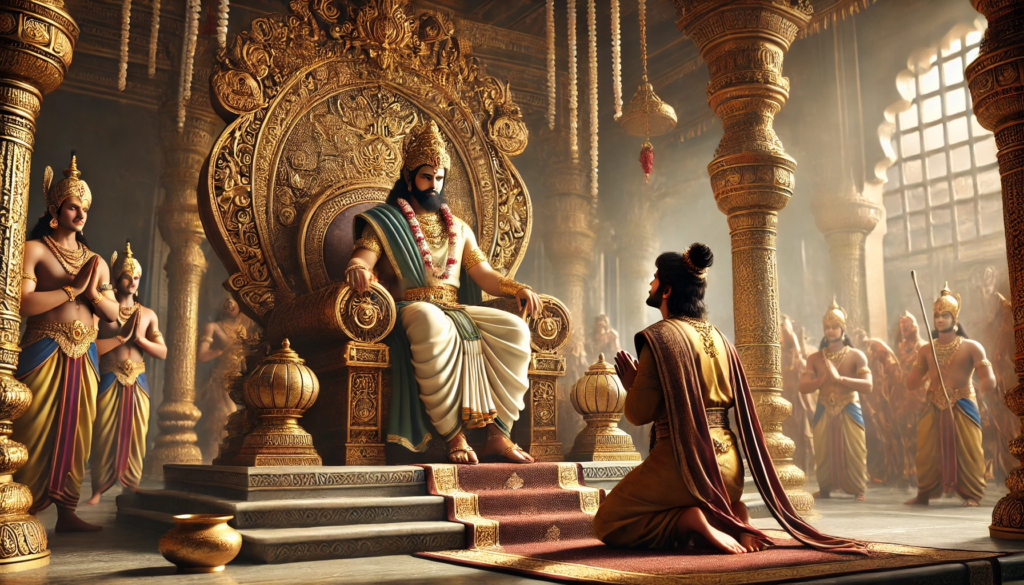
Explanation
As the scene unfolds, Ravana is surrounded by his courtiers who praise him, speaking words that echo his own vanity. This highlights Ravana’s arrogance, as his followers refrain from giving him sound counsel and only flatter his ego, further clouding his judgment.
In this moment, Vibhishana, Ravana’s younger brother, enters the court with humility, bowing respectfully at Ravana’s feet. Vibhishana represents a voice of wisdom and concern, seeking the well-being of his family and kingdom. He advises Ravana that anyone who desires their own prosperity, honor, and peace should abandon any wrongful desires or actions. Here, he metaphorically refers to Sita, suggesting that she should be returned to Lord Rama, comparing Sita to the fourth lunar day, which is considered inauspicious if not released.
Further, Vibhishana reminds Ravana that the entire universe has only one rightful ruler and that a king should avoid causing harm to others. A true leader, Vibhishana implies, possesses qualities like compassion and generosity, rather than being ruled by greed or arrogance. These verses emphasize Vibhishana’s steadfast wisdom and compassion, contrasting with Ravana’s hubris.
Doha
kama krodha mada lobha saba natha naraka ke pantha,
saba parihari raghubirahi bhajahu bhajahi jehi santa.
Explanation
In this doha, Vibhishana offers crucial advice to Ravana by pointing out the destructive nature of human vices. He warns that kama (desire), krodha (anger), mada (pride), and lobha (greed) are pathways to ruin, leading one toward the metaphorical “path of hell” or suffering. Vibhishana encourages Ravana to let go of these negative emotions and instead to seek refuge in Lord Rama, whom the wise and enlightened (santa, or sages) revere.
This doha underscores the spiritual wisdom that detachment from harmful emotions and devotion to righteousness (symbolized by Lord Rama) can bring peace and redemption. Vibhishana’s words serve as a reminder that unchecked desires and pride often lead to downfall, a timeless teaching applicable in both personal growth and leadership. Here, Vibhishana’s counsel is not just meant for Ravana but also acts as a broader reminder of the importance of humility, control over one’s impulses, and devotion to higher principles.
Chaupai
tata Rama nahi nara bhupala, bhuvanesvara kalahu kara kala.
brahma anamaya aja bhagavanta, byapaka ajita anadi ananta.go dvija dhenu deva hitakari, kripa sindhu manusha tanudhari.
jana ranjana bhanjana khala brata, beda dharma racchaka sunu bhrata.tahi bayaru taji nai matha, pranatarati bhanjana raghunatha.
dehu natha prabhu kahu baidehi, bhajahu Rama binu hetu sanehi.sarana gae prabhu tahu na tyaga, bisva droha krita agha jehi laga.
jasu nama traya tapa nasavana, soi prabhu pragata samujhu jiya ravana.
Explanation
In this passage, Vibhishana continues his plea to Ravana with reverence for Lord Rama, describing Rama not merely as a king or human but as the supreme protector and sustainer of the universe. He refers to Lord Rama as the “Lord of the universe” and the “Conqueror of Time,” going beyond the human image to emphasize His divine, eternal nature. Vibhishana elaborates on Rama’s qualities as compassionate and omnipresent, a manifestation of boundless mercy, who took human form to protect the noble (go, the cows), the virtuous (dvija, Brahmins), and to serve the welfare of the world.
Vibhishana urges Ravana to abandon any animosity toward Lord Rama, humbling himself before the Lord, who is the destroyer of all afflictions and protector of devotees. He pleads with Ravana to release Sita and embrace Lord Rama as the one true path of devotion and love, free of ego and hatred.
Vibhishana underscores that Lord Rama, as the eternal and ultimate divine being, forgives even the gravest sins if one seeks His refuge. Rama is described as the Lord whose mere name erases the severe suffering (tapa) of worldly existence. By conveying this, Vibhishana hopes Ravana will understand Rama’s power and grace and recognize Him not as an enemy but as the universal protector. This passage illustrates the virtues of surrendering pride and hostility, reminding us of the power of forgiveness and devotion.
Doha
bara bara pada lagau binaya karau dasasisa,
parihari mana moha mada bhajahu kosaladhisa.muni pulasti nija sishya sana kahi pathai yaha bata,
turata so mai prabhu sana kahi pai suavasaru taat
Explanation
In this doha, Vibhishana humbly pleads with Ravana, expressing his reverence by repeatedly bowing at Ravana’s feet. He implores Ravana to abandon pride, attachment, and arrogance, and to embrace Lord Rama, the ruler of Kosala, as his refuge. Vibhishana’s words are filled with sincerity and concern, emphasizing the benefits of humility and surrender to Lord Rama as the path to peace and righteousness.
In the following lines, Sage Pulastya (Ravana’s grandfather) sends a message with one of his disciples. The disciple conveys the urgency of Vibhishana’s plea, encouraging Ravana to abandon enmity toward Lord Rama. This adds gravity to the situation, as even the revered Sage Pulastya advises that aligning with Lord Rama is the wisest choice for peace and salvation.
These verses serve as a reminder of the importance of humility, detachment, and choosing righteousness over ego-driven conflicts, showing that even the gravest errors can be corrected with sincere devotion and repentance.
Chaupai
malyavanta ati sachiva sayana, tasu bachana suni ati sukha mana.
tata anuja tava niti bibhushana, so ura dharahu jo kahata bibhishana.ripu utakarasha kahata satha dou, duri na karahu iha hai kou.
malyavanta griha gayau bahori, kahai bibhishanu puni kara jori.sumati kumati saba ke ura rahahi, natha purana nigama asa kahahi.
jaha sumati taha sanpati nana, jaha kumati taha bipati nidana.tava ura kumati basi biparita, hita anahita manahu ripu prita.
kalarati nisichara kulakeri, tehi sita para priti ghaneri.
Explanation
In this passage, Malyavan, a wise and experienced advisor of Ravana, reflects on Vibhishana’s words with satisfaction, recognizing his younger brother’s wisdom as a valuable quality. Malyavan encourages Ravana to embrace the wise counsel given by Vibhishana and to consider his advice earnestly. However, Ravana’s pride and stubbornness keep him from appreciating the value of such advice, seeing any warnings against his plans as a sign of disloyalty.
Malyavan returns home, while Vibhishana continues his efforts, folding his hands respectfully and explaining that every person harbors both good and bad tendencies (sumati and kumati) in their hearts. Ancient scriptures emphasize that where there is wisdom (sumati), prosperity follows; conversely, where there is folly (kumati), only misfortune prevails. Vibhishana points out that Ravana’s mind, overtaken by kumati, now perceives good as bad, and allies as adversaries. This misunderstanding causes Ravana to remain attached to Sita, even though this attachment brings inevitable disaster to the entire demon lineage.
Doha
taat charana gahi magau rakhahu mora dulara,
sita dehu Ram kahun ahit na hoi tumhara
Explanation
In this doha, Vibhishana, with heartfelt humility, pleads to his elder brother Ravana, holding his feet in respect and affection. He asks Ravana to consider his plea as a loving younger brother and to protect their family’s well-being by returning Sita to Lord Rama. Vibhishana emphasizes that returning Sita would not only prevent harm but also avert the impending disaster that threatens their lineage and kingdom due to Ravana’s defiance.
Chaupai
budha purana sruti sammata bani, kahi bibhishana niti bakhani.
sunata dasanana utha risai, khala tohi nikata mrityu aba aijiasi sada satha mora jiava, ripu kara paccha murha tohi bhava.
kahasi na khala asa ko jaga mahi, bhuja bala jahi jita mai nahi.mama pura basi tapasinha para priti, satha milu jai tinhahi kahu niti.
asa kahi kinhesi charana prahara, anuja gahe pada barahi bara.uma santa kai ihai barai, manda karata jo karai bhalai.
tumha pitu sarisa bhalehi mohi mara, ramu bhaje hita natha tumhara.sachiva sanga lai nabha patha gayau, sabahi sunai kahata asa bhayau.
Explanation
In these chaupai verses, Vibhishana attempts to counsel Ravana with wisdom derived from ancient texts, reminding him of righteousness. Ravana, however, is furious, interpreting his advice as a sign of betrayal. He warns Vibhishana that death is near, accusing him of cowardice and aligning with the enemy. Ravana, overwhelmed by pride, questions if anyone in the world could match his strength and mocks Vibhishana’s compassion for ascetics and love for Rama.
Ravana’s anger culminates in striking Vibhishana with his foot. Despite the insult, Vibhishana humbly submits, reminding Ravana that only a true friend dares to speak hard truths. Vibhishana leaves, joined by his loyal advisors, taking to the skies while expressing that he wishes for Ravana’s welfare. This poignant scene underlines the tragic consequences of Ravana’s pride and foreshadows his downfall.
Doha
ramu satyasankalpa prabhu sabha kalabasa tori,
mai raghubira sarana aba jau dehu jani khori.
Explanation
In this doha, Vibhishana expresses his unwavering faith in Lord Rama’s divine will and truthfulness. He acknowledges that Rama’s intentions are steadfast and above the influence of time or fate, a mark of his supreme power and authority over all creation. With deep conviction, Vibhishana decides to surrender completely to Lord Rama, seeking refuge and guidance. He respectfully pleads for understanding as he makes this choice, fully trusting that Rama, being all-compassionate, will accept him without judgment. This verse reflects Vibhishana’s pure devotion and his readiness to embrace a path of righteousness, even if it means abandoning his kin.
Chaupai
asa kahi chala bibhishanu jabahi, ayuhina bhae saba tabahi.
sadhu avagya turata bhavani, kara kalyana akhila kai hani.ravana jabahi bibhishana tyaga, bhayau bibhava binu tabahi abhaga.
caleu harashi raghunayaka pahi, karata manoratha bahu mana mahi.dekhihau jai charana jalajata, aruna mridula sevaka sukhadata.
je pada parasi tari rishinari, dandaka kanana pavanakari.je pada janakasuta ura lae, kapata kuranga sanga dhara dhae.
hara ura sara saroja pada jei, ahobhagya mai dekhihau tei
Explanation
In these verses from the Sundarkand, we witness a pivotal moment involving Vibhishana, Ravana’s brother, who decides to abandon his tyrannical sibling.
The first line highlights Vibhishana’s urgency in realizing that aligning with righteousness is essential for his survival. He seeks the blessings of Goddess Bhavani for the welfare of all, indicating that his choice serves a greater good.
As he departs from Ravana, Vibhishana acknowledges his feelings of being lost without his brother’s support. However, he joyfully heads towards Lord Rama, filled with hope and aspirations to restore Dharma.
Vibhishana expresses a deep desire to see Rama’s divine feet, symbolizing purity and spiritual enlightenment, as serving Rama brings ultimate happiness. He acknowledges that those who touch Rama’s feet attain liberation, emphasizing Rama’s immense power and blessings.
He recalls Sita, the daughter of King Janaka, cherished in Rama’s heart, symbolizing love and devotion. In the end, Vibhishana expresses immense gratitude for witnessing Rama’s divine form, signifying his fortunate choice to follow the path of righteousness.
FAQ
Why did Vibhishana become immortal?
Vibhishana became immortal because he aligned himself with Lord Rama, the embodiment of dharma (righteousness). After the defeat of Ravana, Rama granted Vibhishana the boon of immortality for his loyalty and wisdom, allowing him to rule Lanka as a just king.
What happened to Vibhishana?
After Ravana’s defeat, Vibhishana was appointed as the king of Lanka by Lord Rama. He ruled justly and ensured that dharma was upheld in the kingdom. His character is often celebrated for embodying wisdom and righteousness.
What is Vibhishana famous for?
Vibhishana is famous for his unwavering commitment to righteousness and his wise counsel to Ravana. He is recognized for his role in advising Ravana against wrong actions, particularly regarding Sita’s abduction, and for ultimately siding with Lord Rama, which led to his redemption.
Was Vibhishana good or bad?
Vibhishana is portrayed as a good character in the Ramayana. He embodies virtues such as wisdom, humility, and compassion, contrasting sharply with Ravana’s arrogance and pride. His actions are aligned with dharma, making him a symbol of righteousness.
Who is still alive from Ramayana?
In traditional beliefs, it is said that Vibhishana is still alive, having been granted immortality by Lord Rama. Some legends also suggest that Hanuman may still exist due to his divine nature and eternal devotion to Rama.
Why did Mandodari curse Hanuman?
Mandodari cursed Hanuman in a moment of grief and anger after the death of her husband, Ravana. She blamed Hanuman for his role in Ravana’s demise and expressed her sorrow by cursing him, wishing that he would suffer for the pain caused to her family.
Did Mandodari commit Sati?
In various versions of the Ramayana, it is suggested that Mandodari did not commit Sati (the practice of a widow self-immolating on her husband’s funeral pyre). Instead, she is often depicted as mourning Ravana deeply but ultimately choosing to live on, reflecting her strength and resilience.
Did Ravana kidnap Mandodari?
No, Ravana did not kidnap Mandodari. Instead, she is often portrayed as his devoted wife. Their relationship is depicted as one of love and loyalty, despite Ravana’s many flaws and his wrongful actions in abducting Sita.

